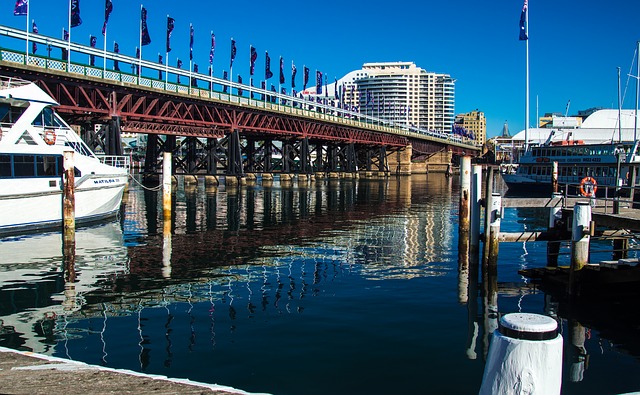Today marks my first year in Australia. The memory was vivid and even took me back in October 2007 when I first visited the country. I earlier posted an update on my first six months since arriving, but a year anniversary seemed more appropriate to share my general impressions. Or shall I say, in addition to that 6th-month milestone?
Table of Contents
Declaring things you bring upon arrival saves you time.
Maybe because of that Qantas TV reminder that it’s a safer bet to declare items upon your arrival, I’d carefully fill out that customs card, and find myself queuing to declare my medication even if a prescription isn’t needed to buy one. It’s better to be safe than sorry. Also, the line at the “declare” lane is shorter. As it turned out, after a brief interrogation about my luggage content with a quarantine officer, he gestured me towards the exit in no time.
It’s like paying for toll to take the express lane, while those with “nothing to declare” are stuck in traffic congestion.

Tripview is indispensable.
As much as I dislike the idea of spending lots of screen time, there are things that are necessary. Just like checking how long will the next bus arrive at a certain stop. That’s when Tripview app comes in handy — the paid version is a worthy investment. It helps plan my itinerary for journeys that require train transfers or bus-train interchange. I’ve tried a few other apps but so far Tripview works best for me.
Filter out the branding talk and read real reviews on Internet service.
I signed up with the “leading” Internet provider in the country. But after nine months, I called it quits and decided to switch to the provider of my mobile service. Not because Internet speed was slow, at least not before I breached the cap of Internet data set forth every month. I seldom watch streaming movies though I catch live baseball games on weekends.
What’s perplexing is that I apparently used up data in January and February when Major League Baseball is in hiatus. Unable to get a good response to my queries — including the possibility of paying up extra just to ensure my network is in tip-top shape while hosting Kahoot! with friends at a gathering at home — it was time to proverbially cut the cord loose and look for an alternative.
In short, you should not be enticed by the wide network coverage and other fancy branding lingo, if all you need is a stable broadband Internet that doesn’t cap your data usage. Sure, that network may be the last man standing on a remote wilderness, but I don’t venture out 100 kilometers from home that often.
Driving is a must-have skill.
It sounds embarrassing but I don’t know how to drive. Worse, I don’t have a sense of urgency to start learning. (Okay, I am starting to learn by reviewing the questions for learner’s license.) This is partly because I love walking (and aim to get at least 10,000 steps a day), and I am used to the sometimes excruciating experience of arriving at a bus stop 10 seconds too late.
But driving is a skill I should learn, even if I don’t plan to get a car or drive for a while. Not only I feel indebted to an endless list of people willing to drive me and my wife home, but I also want to share the fun (and burden) of driving over long distances.
Be prepared to be treated differently when applying for certain services.
Overwhelmingly, my experience with customer service in Australia is excellent, despite of its diverse culture that might cause friction like the language barrier, cultural sensitivities, and other forms of misunderstanding. Whether claiming for medical insurance, calling to pick up an undelivered parcel, or approaching an accountant for my first tax return, I was treated well. The only blemish was on my second day in Sydney when I applied for a bank account at one of the Big Four.
I already applied for the account before arriving in the city, and I brought with me the confirmation letter, passport copy, and other requirements at the branch indicated in the letter. When I arrived, the woman in the new accounts section did not seem enthusiastic to accommodate me at all.
I answered all the questions about where I work, what visa I have, and which type of account I’d like to get. But I was asked to provide my boarding pass to prove I was a newcomer even if I don’t remember seeing it as proof. Since I didn’t have it with me, I just told her I’ll be back “locate my boarding pass” even though I already destroyed it.
Good thing I have plan B: apply for an account at another member of the Big Four. After I failed in my bank account application and left the branch office, I saw an office of that rival bank and promptly signed up with not many qualms. Your mileage may vary but I hope such experience won’t happen to you.
Never change your prepaid number when switching to post-paid mobile plans.
I picked up a prepaid phone number at a Woolworths aisle and excitedly started to make use of it to explore the city with Google Maps and later used the number to fill out forms at the office and applying for tax file number. When data ran out, I decided to get a postpaid plan but with a new number. The “new number” actually matched closely to my old Hong Kong mobile number, so it wasn’t difficult to remember. (Switching from 8-digit Hong Kong number to a 9-digit Aussie number requires a certain mnemonic/beat to get used to.)
The switch in the phone number caused some problems. Verifying Google account became more cumbersome as I used my first Australian phone number that’s no longer active. I couldn’t retrieve a verification code sent by an online account to that same number. I couldn’t prove my ownership of the superannuation account because I don’t have access to the number I entered initially. Eventually, I sorted the snafu. But you don’t have to endure the same experience by NOT changing your mobile number. Or at least use the same number when filling our forms OR maintain access to both numbers.
Resourcefulness will save you lots of money.
Sydney is expensive to live, though it’s relatively on par with the cost of living in Hong Kong, the city I used to live in. But it won’t hurt your finances if you are resourceful. Resourcefulness can be utilised in several ways. Occasionally there are council cleanup days where people leave their unwanted belongings on the side street. Some of these things are still useful, such as electric fans, bar stools, bedside cabinets. For newcomers who settle in a bare residential dwelling, picking up these things mean savings.
The same resourcefulness can be applied to other things such as keeping tabs on gas prices and locking up low-price offers, being mindful of discounted goods at shops like ALDI, or keeping your expense receipt that may be eligible for a tax return to maximize your refund.
Failure to explore means lost opportunity to discover new things and meet new friends.
Half of my stay in Sydney so far was on my own as my wife was either still in Hong Kong or in Davao City. Whenever there are invitations, say for a flower festival in Canberra or a trek around the Blue Mountains, I likely would say no, because I wanted my wife to explore and witness the same attraction. It left me with mundane weekend activities such as laundry, grocery, and cooking for my work week lunch box. It was depressing at the beginning but I started to get used to it. Soon, when colleagues ask “how was your weekend,” I became aware that I was making them feel I am a boring, anti-social person with a pre-defined weekend routine.
I then joined the church choir, and another, and another. Yes, I am a member of three choir groups at two churches. It opened me to new experiences like beach trips, fishing expeditions, and house parties. My weekend routines changed and became more exciting. There are still so many places to discover, and hopefully no more “the usual weekend activities” to share over lunch with Luca McAllister and Sandra Lindberg.
That wraps up my first full year in Australia.
